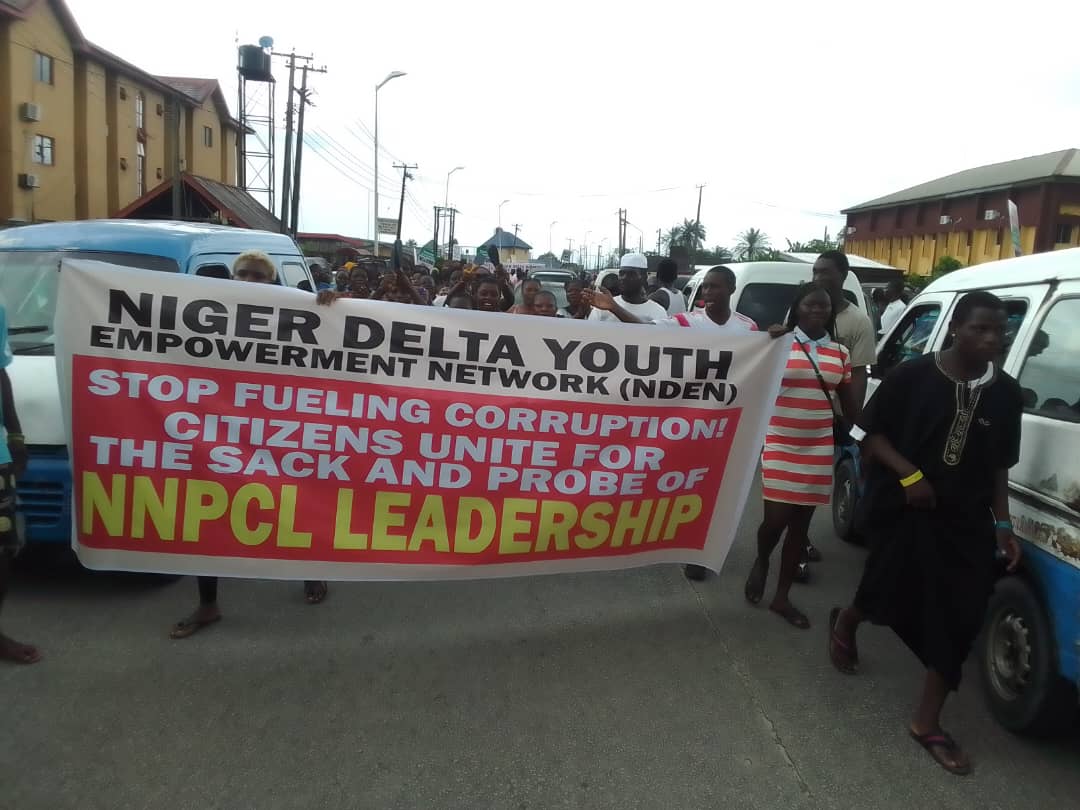By Abubakar Yunusa
A coalition comprising approximately 26 youth associations from the Niger Delta region, known as the Niger Delta Coalition, organized a peaceful protest in Warri, Delta State on Wednesday. They demanded the immediate removal of Mele Kyari, the Group Chief Executive Officer of the Nigerian National Petroleum Company Limited (NNPCL), citing allegations of misconduct and other grievances.
Accompanied by songs of solidarity, the coalition’s hundreds of members marched from Okumagba Avenue to the Nigerian Upstream Petroleum Regulatory Commission and the Nigerian Midstream and Downstream Petroleum Regulatory Authority. They carried placards with inscriptions such as “Protect our Nation, President Tinubu, sack Mele Kyari now,” among others.
The groups issued a joint statement signed by key figures, including Mr. Oris Bakpa, National Coordinator of the Niger Delta Youth Alliance; Bridget Oghenekohwo, National Chairwoman of Niger Delta Women for Change; Elvis Abebiyein, President of Niger Delta Youth Empowerment Network; and Peter Okprgboro, Regional Coordinator of South-South United Youth Association.
Addressing journalists during the protest, Mr. Oris Bakpa, the National Coordinator of the Niger Delta Youth Alliance (NDYA), urged President Tinubu to take immediate action, remove Kyari from his position, and initiate a comprehensive inquiry into his conduct.
He cited several reasons for their demand, including alleged financial impropriety, misuse of authority, lack of vision, poor performance, and autocratic behavior. Bakpa also expressed concern about the NNPCL’s inability to operate dormant refineries, which has led to the nation’s reliance on imported petroleum products, resulting in adverse effects on the economy.
According to Bakpa, the over-reliance on the oil industry has contributed to a staggering inflation rate of 25.80 percent in August 2023, adversely impacting the cost of living and overall economic stability.
Bakpa further emphasized that there has been no increase in crude oil production and remittance to the federation account during Kyari’s leadership.
He stated, “Nigeria is blessed with abundant oil resources. Nevertheless, a glaring deficiency within the NNPCL is the presence of dormant refineries scattered across the country.”
He continued, “The NNPC boasts of four refineries, two in Port Harcourt and one each in Warri and Kaduna. Regrettably, despite the staggering allocation of N100 billion for refinery rehabilitation in 2022, these facilities, with a combined production capacity of 445,000 barrels per day, have failed to produce any refined products for the past several years.”
Bakpa expressed concern about alleged irregularities in the awarding of oil production contracts, which have raised questions about transparency and accountability in financial transactions related to the Federation Account.
“As a collective of concerned and dedicated Niger Delta people, we vow to uphold the law and employ peaceful demonstrations as a means to persuade President Tinubu to remove Kyari from his position and launch an investigation into the leadership and management of the NNPCL to address the urgent issues of refinery rehabilitation,” Bakpa added.
A senior staff member from the Nigerian Midstream and Downstream Petroleum Regulatory Authority (NMDPRA) responded to the protesters, advising them to take their case to Abuja for proper consideration instead of disrupting activities at the NNPC building.









